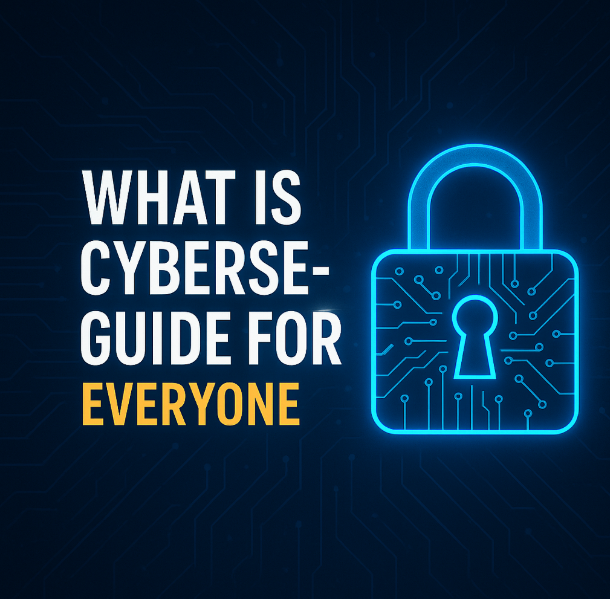What is Cybersecurity? A Complete Beginner-to-Expert Guide (2025 Edition)
Learn the meaning of cybersecurity, top cyber threats, best practices, and future trends — protect yourself and your business in the digital age.
9/23/20253 min read


What is Cybersecurity? A Complete Guide for Everyone (2025 Edition)
Introduction
Imagine leaving your house unlocked all night. Anyone could walk in, take your valuables, and disappear. In today’s digital world, leaving your information unprotected is just like leaving that door wide open.
Cybersecurity is the lock, alarm system, and guard all rolled into one for your digital life. From personal emails and bank accounts to business websites and customer data — cybersecurity ensures everything stays safe.
In this blog, created by Our Secure Universe Pvt Ltd, we’ll break down cybersecurity in the simplest possible way, so that anyone — whether a student, a professional, or a business owner — can understand why it’s so important in 2025 and how to stay protected.
What is Cybersecurity?
At its core, cybersecurity is the practice of defending computers, networks, and digital data from theft, damage, or unauthorized access.
Think of it as a digital defense system that includes:
Network Security → keeping your internet connections safe.
Application Security → protecting apps and websites from hacks.
Cloud Security → securing data stored in cloud platforms.
Endpoint Security → protecting individual devices like laptops, phones, tablets.
Data Security → ensuring sensitive information doesn’t fall into the wrong hands.
👉 In short: Cybersecurity protects your digital world just like locks, CCTV cameras, and security guards protect your physical world.
Why Cybersecurity Matters in 2025
The digital landscape has changed drastically. Let’s look at a few numbers:
A cyber attack happens every 39 seconds (University of Maryland).
43% of attacks target small businesses, yet only 14% are prepared (Verizon DBIR).
The average cost of a data breach in 2024 was $4.45 million (IBM Security Report).
In India alone, cybercrime cases increased by 24% year-on-year (NCRB).
For individuals:
Identity theft, financial fraud, hacked social media accounts.
For businesses:
Loss of customer trust, heavy financial damage, legal penalties.
👉 In short: Without cybersecurity, you risk your money, reputation, and future growth.
Common Cyber Threats (Explained with Examples)
1. Phishing
Fake emails or messages that look real but are designed to steal your login details.
Example: You receive an email that looks like it’s from your bank asking you to “verify your account.” Once you click the link and log in, hackers steal your password.
2. Ransomware
A type of malware that locks your files and demands money to unlock them.
Case Study: In 2017, the WannaCry ransomware attack hit 230,000 computers worldwide, including hospitals, banks, and universities.
3. Weak Passwords
Using “123456” or “password” is like leaving your door wide open.
Case Study: The Yahoo breach (2013–2014) compromised over 3 billion accounts, partly due to weak credentials.
4. Social Engineering
Hackers tricking humans instead of machines.
Example: A hacker calls pretending to be from IT support and convinces an employee to share login credentials.
5. Insider Threats
Sometimes, employees themselves misuse access.
Example: A staff member downloads company data and sells it to competitors.
How Cybersecurity Protects You
Safeguards Personal Data
Protects bank details, health information, and private conversations.Secures Business Operations
Keeps websites and apps running smoothly without downtime.Builds Customer Trust
Clients feel safe when they know their data is secure.Ensures Legal Compliance
Laws like GDPR and India’s DPDP Act demand strong data protection.
Practical Cybersecurity Tips for Everyone
For Individuals:
Use strong, unique passwords (12+ characters).
Enable two-factor authentication (2FA).
Avoid clicking suspicious links or attachments.
Keep your software and apps updated.
Use antivirus and VPN for extra safety.
For Businesses:
Train employees about phishing and scams.
Regularly back up important data.
Set up firewalls and intrusion detection systems.
Conduct routine security audits.
Work with trusted cybersecurity providers like Our Secure Universe Pvt Ltd.
The Future of Cybersecurity (2025 and Beyond)
AI in Security
Artificial Intelligence is being used to detect unusual activity and stop attacks before they spread.Zero Trust Security
The idea: “Never trust, always verify.” Every access request is checked multiple times.Continuous Threat Exposure Management (CTEM)
Businesses will constantly test their defenses to find weak points before hackers do.Quantum Computing Risks
While still developing, quantum computers may one day break traditional encryption — pushing us to invent stronger security systems.
Case Study: The Cost of Ignoring Cybersecurity
In 2021, Colonial Pipeline in the U.S. was hit by ransomware. The company had to shut down fuel supply for days, causing shortages across several states. They paid $4.4 million in ransom.
👉 Lesson: Even one weak spot can cause massive financial and reputational damage.
FAQs About Cybersecurity
Q1. Can small businesses afford cybersecurity?
Yes. Many affordable solutions exist. A single attack usually costs far more than investing in prevention.
Q2. Is antivirus enough?
No. Antivirus is just one layer. Businesses also need firewalls, backups, monitoring, and employee training.
Q3. How do hackers usually break in?
Mostly through phishing, weak passwords, or unpatched software.
Q4. What is the best way to start improving cybersecurity today?
Begin with strong passwords, enable 2FA, and get a professional security audit.
Conclusion
Cybersecurity is no longer optional — it is the digital seatbelt of our time. Whether you’re an individual protecting personal accounts or a business securing sensitive data, the risks of ignoring it are simply too high.